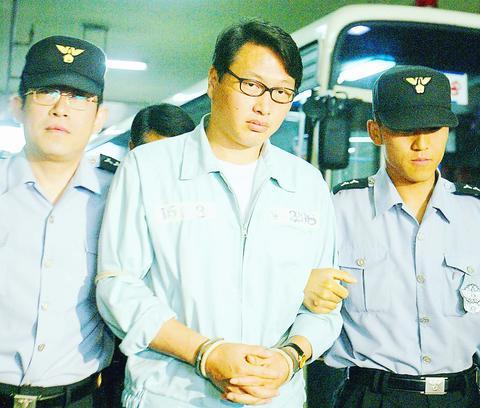SK Group owner Chey Tae Won was jailed for three years by a South Korean court on fraud charges relating to an accounting scandal at its trading arm, sending shares and bonds in the group's listed units soaring.
Chey, who has been in custody since February, is the nephew of the late founder of SK, Korea's fourth-largest business group.

PHOTO: REUTERS
Nine other SK Group executives, including Chairman Son Kil Seung and SK Corp. President Kim Chang Keun also were found guilty but drew suspended sentences.
The sentence came as a surprise in Korea, where the country's media had raised expectations Chey would be released.
SK Corp stock rallied by its daily 15 percent limit after the announcement, while the difference in yield between the company's dollar debt and US Treasuries tightened.
"This is a big surprise," said Namuh Rhee, the managing partner at Rhee Capital Advisers, which has about US$30 million in Korean stocks. "The verdict shows that Korean society wants to end the past legacy and the judges are making independent decisions."
Shares in SK Corp, the nation's largest oil refiner, surged as much as 15 percent to 11,700 after the verdict. SK Telecom Co, Korea's largest mobile phone operator, gained as much as 6.6 percent to 201,000 won.
Investors had seen the case as a test of Korea's pledges to crack down on corporate corruption and fraud.
"Is it good? Yes, because if you do wrong and are found guilty, there's a penalty," said Markus Rosgen, Asian equity strategist at ING Securities Ltd in Hong Kong. "This will help to lower the risk premium of investing in Korea, so it's good for equities."
The decision is also likely to have an impact on SK Corp directors, who are due to meet on Sunday to approve the company's proposed bailout for ailing affiliate SK Global Co, the trading arm at the center of the accounting scandal.
The board's decision on Sunday whether to rescue ailing SK Global will influence the crucial meeting of SK Global's 59 Korean lenders next week.
On Tuesday, creditors will vote on whether to convert about half of what they are owed into equity in the trading company, creditor officials said.

WAITING GAME: The US has so far only offered a ‘best rate tariff,’ which officials assume is about 15 percent, the same as Japan, a person familiar with the matter said Taiwan and the US have completed “technical consultations” regarding tariffs and a finalized rate is expected to be released soon, Executive Yuan spokeswoman Michelle Lee (李慧芝) told a news conference yesterday, as a 90-day pause on US President Donald Trump’s “reciprocal” tariffs is set to expire today. The two countries have reached a “certain degree of consensus” on issues such as tariffs, nontariff trade barriers, trade facilitation, supply chain resilience and economic security, Lee said. They also discussed opportunities for cooperation, investment and procurement, she said. A joint statement is still being negotiated and would be released once the US government has made

NEW GEAR: On top of the new Tien Kung IV air defense missiles, the military is expected to place orders for a new combat vehicle next year for delivery in 2028 Mass production of Tien Kung IV (Sky Bow IV) missiles is expected to start next year, with plans to order 122 pods, the Ministry of National Defense’s (MND) latest list of regulated military material showed. The document said that the armed forces would obtain 46 pods of the air defense missiles next year and 76 pods the year after that. The Tien Kung IV is designed to intercept cruise missiles and ballistic missiles to an altitude of 70km, compared with the 60km maximum altitude achieved by the Missile Segment Enhancement variant of PAC-3 systems. A defense source said yesterday that the number of

‘CRUDE’: The potential countermeasure is in response to South Africa renaming Taiwan’s representative offices and the insistence that it move out of Pretoria Taiwan is considering banning exports of semiconductors to South Africa after the latter unilaterally downgraded and changed the names of Taiwan’s two representative offices, the Ministry of Foreign Affairs (MOFA) said yesterday. On Monday last week, the South African Department of International Relations and Cooperation unilaterally released a statement saying that, as of April 1, the Taipei Liaison Offices in Pretoria and Cape Town had been renamed the “Taipei Commercial Office in Johannesburg” and the “Taipei Commercial Office in Cape Town.” Citing UN General Assembly Resolution 2758, it said that South Africa “recognizes the People’s Republic of China (PRC) as the sole

Taiwanese exports to the US are to be subject to a 20 percent tariff starting on Thursday next week, according to an executive order signed by US President Donald Trump yesterday. The 20 percent levy was the same as the tariffs imposed on Vietnam, Sri Lanka and Bangladesh by Trump. It was higher than the tariffs imposed on Japan, South Korea and the EU (15 percent), as well as those on the Philippines (19 percent). A Taiwan official with knowledge of the matter said it is a "phased" tariff rate, and negotiations would continue. "Once negotiations conclude, Taiwan will obtain a better